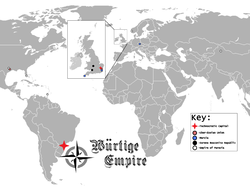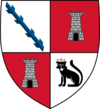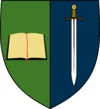Würtige Empire
Würtige Empire | |||||||
|---|---|---|---|---|---|---|---|
| Motto: Ad Victoriam, Ex Sapientia (Latin: To Victory, By Knowledge) | |||||||
| Anthem: Preußens Gloria | |||||||
 Map of the Würtige Empire (excluding the Crown Colony of New Lacedaemonia in Tasmania) | |||||||
| Capital | Technocratic Capital of Würdigeland | ||||||
| Official languages | English and German (official) Portuguese and Czech (Regional) | ||||||
| Demonym(s) | Würtige | ||||||
| Government | Technocratic constitutional monarchy | ||||||
• Emperor | Newton I | ||||||
| James Frisch | |||||||
| Legislature | Würtige Imperial Council | ||||||
| Establishment | 10 December 2012 | ||||||
| Population | |||||||
• Census | 31 (Wurdigeland, Ottoburg and Beacon City) | ||||||
| Currency | Würtige Mark | ||||||
| Time zone | UTC-03 (Würdigeland | ||||||
| |||||||
The Würtige Empire is an imperial confederation of nation-states, bound by the Second Würtige Joining Treaty. Wurtige nations, in accordance with this treaty, defer to the powers of the imperial government and the Emperor, Kaiser Newton I. The Würtige Crown holds the colony of New Lacedaemonia on an island near Tasmania.
Etymology
Würtige comes from the demonym of Würdigeland, it is a variation of the German "Würdige", which means "worthy". Emperor Arthur calls Wurdigeland the "Empire of the Worthy".[1]
History
Establishment and Referendums
The Würtige Empire was officially established on 10 December 2012 as the Confederate States of Prosperity was dismantled. Each nation in the CSP, prompted by Emperor Arthur I of Würdigeland and Richard Hytholoday of Burnham (now Clyro), held national referendums on whether they should join the Würtige Empire or become independent states. Of the six Confederate states, only two became Autonomous Member States within the Empire; The Independent Daenningas Regional Dominion of Burnham & its Lands (now the Region of Clyro) and the Knoll Island Empire (now the Tsardom of Nolland).
The Pavlov Issue
Pavlov, while not a member of the CSP, was extended the courtesy of joining the Empire in early December 2012. After a lengthy referendum, Pavlov's government chose to join and signed the Joining Treaty. However, in the second Council meeting, Alexander IV, Emperor of Pavlov (the leader of Pavlov) opposed the centralisation of the Empire's armed forces, and motioned for Pavlov to leave the Würtige Empire. This motion was backed by representatives of the High Kingdom of Knoll. Pavlov was an Autonomous Member State of the Empire for only two weeks.
The GUM multiple membership Issue
After the creation of the Empire, worries about the states' representation within the Grand Unified Micronational (GUM) resulted in discussions between Arthur Lobao, Richard Hytholoday and the Grand Unified Micronational. This culminated in Hytholoday putting forward an argument to the entire Quorum of Delegates in early January 2013, which resulted in the GUM allowing the states to being separately represented in the Quorum.
Early during the term of Ciprian I of Juclandia as Chair of the Quorum in January 2014, pressure was applied to reduce the number of Würtige Empire memberships from three (Würdigeland, Nolland and Clyro) to one pan-Imperial membership. This was strongly opposed in the Würtige Empire itself, and the Ashukov Federation's delegate in a Quorum that month made a statement criticising the move. The pressure from the Chair and the Supreme Judge (Bradley of Dullahan at the time) was dropped, and the Supreme Judge later declared support for multiple Imperial memberships.
The Freihetian Aggression
The Würtige Empire sustained heavy criticism from independents within former Confederate States, but there were few nationalised opponents to the Empire's existence, apart from the Empire of Freihetia, headed by Markus II.
During the foundation of the Empire and the dissolution of the CSP, Freedomia was severely against the joining of states in the newly founded Empire. Markus II ignored calls for a referendum in his country and immediately tried to convince the King of the Knoll Island Empire to refuse membership of the Würtige Empire, which he was able to do thanks to an old Confederate Law which made all citizens of the CSP citizens of every Confederate state. When the Knoll Island Empire's referendum came back in support of Empire membership, King Thomas I of Knoll Island signed the Joining Treaty, and Markus II made several rude and aggressive remarks about the Empire, which led to unrest in the Freihetian Imperial Senate, pro-Würtige Parliamentarians being aggressively removed by Emperor Markus II after a failed coup on the 18 December.
To respond to Freihetian aggression, a jury was called, and Markus was summoned to a trial in the Würtige Empire as a Nollandish citizen. The trial was called while Markus was unable to attend, so he was trialled in absentia on 11 December 2012. He was found guilty of 3 of his 6 charges, which included racism, threatening secession and inciting hatred (allegedly chanting 'Death to Würdigeland!' in the Nollandish Lounge) and was banished from the Empire.
Following these events, there was a struggle in the Freihetian Empire about whether their Emperor's actions were justified or not. Several parliament members either defected to another nations or stood in defiance of Mark's actions. This led to the creation of the Holy Empire of New Israel and other episodes in that nation's history, such as the Würtige Intervention in the New Israeli assembly, and the alleged New Israeli persecution of Rocklund.
In late 2013, it was revealed that Nolland had not actually signed the Joining Treaty by the time of the Markus II trial, meaning that the entire case was technically illegal. However, plans for a retrial were cancelled when Markus could not be contacted, and the general consensus was that the trial was for the best interests of the Empire in the long-term.
Decline
Nolland declared independence from the Empire in early 2015; followed by the illegal secession of the Holy Empire of New Israel on 10 Aug 2015. New Israel was later removed from the Empire, and leading New Israeli government members were declared personae non gratae.
In the November 2015 Mercian election, the First Minister Fionnbarra Ó Cathail promised a referendum on Mercia's membership of the Wurtige Empire. After being re-elected as First Minister, a bill allowing a referendum to be held was passed by the Mercian Parliament House on 24 January, with ratification a week later. The referendum itself was then held from 12 to 14 February, with the result being 93% in favour of leaving the Wurtige Empire. Mercia subsequently withdrew from the Wurtige Empire. On the 24th January, the Beaconite Municipal Assembly passed a motion put forward by HSH Prince James of Beacon City (the successor to New Winterdown) on behalf of Lighthouse to pursue the dissolution of the Empire if Mercia seceded, and as of the 16th February, the Prince intends to comply with the motion and is preparing an official plan.
Reformation of the Empire
On the 12th of December, 2020, after five years of inactivity, Emperor Arthur agreed to abdicate in favour of Emperor Richard in order for a resurgence in the Empire to take place. This resurgence was lead by a group of nations which had recently, within the GUM, been referred to as a new Würtige Bloc due to their close relationships and historical connections to the Empire. Under Emperor Richard, the nations of Uber-Esse, the Serene Beaconite Republic, Paravia and historical member Mercia drafted a Second Wurtige Joining Treaty which would become the new basis for the Empire. The treaty was eventually ratified after Emperor Richard abdicated, in favour of Emperor Newton, then one half of the Lords of Uber-Esse and Palatine-Viceroy of Uberquiesenberg. Under the treaty, all of the aforementioned Würtige Bloc nations joined the Empire under the Second Wurtige Joining Treaty.
On the 25th of January, 2021, James Frisch, delegate to the Serene Beaconite Republic, was confirmed as the first Chancellor of the reformed Empire. Four days later, on the 29th, Chancellor Frisch appointed the Frisch Cabinet, made up of ministers from all nations represented within the Empire.
Government and politics
The Würtige Empire is a technocratic constitutional monarchy governed by the Imperial Council, where the heads of state convene to formulate legislation and policies, and the Imperial Executive which administers the Empire and its inter-state relations.
The Second Würtige Joining Treaty effectively acts as the Constitution of the whole Empire. It establishes the institutions of the Empire and its different types of legislation, as well as a body of universal rights guaranteed to all citizens of the Empire and nationals of its member states. The Imperial Council may pass four different types of statute; Acts, which take force in the entire Empire and are reserved for the issues of Defense, Commerce and Imperial specific administration; Compacts, which can more broadly be specific policies but can only be applied to member states which consent to the Compact; Treaties, the foreign relations of the Empire and Recommendations, which is legislation that only applies to member states that wish to engage in them but does not create a specific policy or law.
The Technocratic Capital of Würdigeland is also a semi-autonomous city with the Empire. It is governed effectively as a separate member state, but does not benefit from the same Imperial representations as other member states. Any citizen of any member state may reside, and have equal political rights, in the Technocratic Capital. The legislative of the Capital is the Parliament of Würdigeland, which legislates in the Capital on any domestic issues that are not a competency of the Imperial Council. Day to day administration of the Capital falls to the Technocratic Cabinet, which is lead by the head of Government, the Prime Minister, and the Capital Ministers. The office of Prime Minister is currently held by vacant.
Foreign Policies
As established by the Second Würtige Joining Treaty, the Empire engages in foreign relations as an single institution but foreign treaties do not automatically apply to member states. Any treaties signed on behalf of the Empire only enter force in member states which agree to the contents of each treaty. Member states can also still engage in foreign relations nationally without the Empire.
The Würtige Empire has four full memberships in the Grand Unified Micronational, those being Uber-Esse, the Serene Beaconite Republic, the Empire of Paravia and Mercia. This group of nations is sometimes referred to as a modern interpretation of the Würtige Bloc.
Würdigeland was also part of the Security Council of the GUM before it was dissolved during the January–March 2013 term of Richard Hytholoday.
The Empire is currently signatory to the following treaties:
- 27 February 2021:
 Commonwealth of Essexia, mutual cooperation
Commonwealth of Essexia, mutual cooperation - 27 February 2021:
 New Virginia, mutual cooperation
New Virginia, mutual cooperation - 27 February 2021:
 Kingdom of Gradonia, mutual recognition
Kingdom of Gradonia, mutual recognition - 6 June 2021:
 Pacem, mutual recognition
Pacem, mutual recognition - 6 June 2021:
 New Florence, mutual recognition
New Florence, mutual recognition - 6 June 2021:
 Vishwamitra, mutual recognition
Vishwamitra, mutual recognition - 20 August 2022:
 New Richmond Republic, mutual cooperation
New Richmond Republic, mutual cooperation - 26 August 2024:
 State of Rovia, mutual cooperation
State of Rovia, mutual cooperation - 26 August 2024:
 Republic of Tinland, mutual cooperation
Republic of Tinland, mutual cooperation
Territories
| Name | Admission | Head of State | Imperial Councillor | Population | |
| Technocratic Capital of Würdigeland | 10 December 2012 | Newton von Uberquie | Henry Clémens | n/a | |
| Colony of Ottoburg | 10 December 2012 | Arthur Lobao | Vacant | 12 | |
| Serene Beaconite Republic | 18 January 2021 | James Frisch | James Frisch | 6 | |
| Uber-Essian Union | 18 January 2021 | Newton von Uberquie Henry Clémens |
Newton von Uberquie | 16 | |
| Mercia | 18 January 2021 | Karl Freidrich | Karl Freidrich | 45 | |
| Empire of Paravia | 18 January 2021 | Patrick Renwick | Patrick Renwick | 50 | |
| Free Republic of Morgannwg | 20 June 2022 | V.I. Hewitt | V.I. Hewitt | 7 | |
| Empyrean of the Moon | 21 August 2022 | Horatio Eden | Horatio Eden | 1 | |
| United Micro-Federation of Northudankton | 02 September 2024 | Jon I | Jon I | 19 | |
Nobility
Economy
The Empire uses the Würtige Mark officially, but the states are free to have their own currency along with the Imperial one. The Northern states are well known for their production of miniatures and high cultural activity, while the Capital is credited by its Universities and cuisine.
Law and order
In major criminal cases, the Imperial Council and the Supreme Judge appoint all personnel to set a trial and decide the affairs at hand. In trivial or local cases, the Supreme Judge legislates according to the code of law.
Military
The Imperial army consists of recruited men from all states who are led by a common Ministry of Defense. The states are not allowed to have independent armies, but may have police forces and national defensive guards.
Culture
The cultures of the Empire are many and varied. The Technocratic Capital of Würdigeland itself prides itself on its Brazilian and Prussian virtues, with a strong military tradition, a pioneering spirit, and with eyes on territorial expansion and the rhetoric behind it.
Cuisine
The capital of the Empire has a diverse cuisine. Although the Empire is prevalently German-based, it derives much from Italian and Portuguese cuisine. The national dish is the seasoned squid a la Portuguese, eaten in festivities and holidays alike.
Awards
In May 18, Emperor Arthur Lobão created the Order of the Black Wolf. This is currently the highest honor in the Empire, awarded to those from whom the Empire has benefited.
References
- ↑ https://wurdigeland.wordpress.com/2012/04/20/the-origin-of-the-word-wurdigeland/ Origin of the Word "Wurdigeland"



